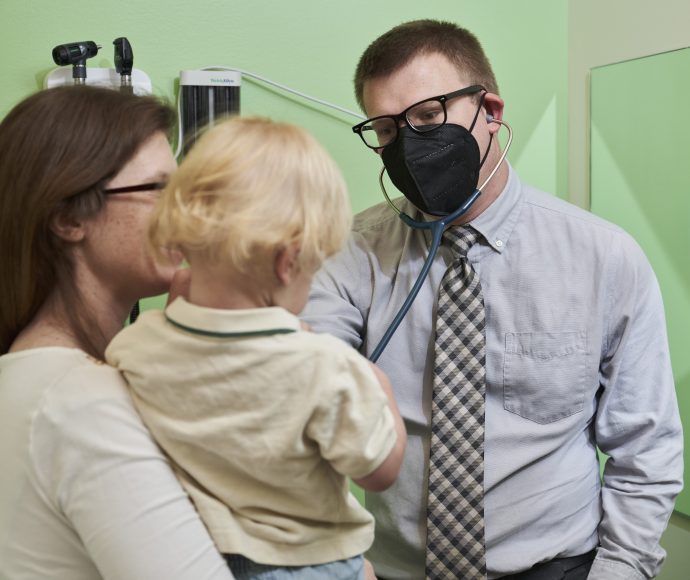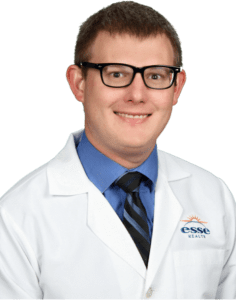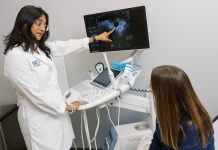In the last few months, we at Esse Health Pediatrics practice here in the St. Louis area have seen an uptick in the number of reported cases of RSV in children. RSV, also known as respiratory syncytial virus, is a common, seasonal illness that can affect anyone, though infants, children, and older adults may experience the most difficulty with symptoms— and some may require hospitalization.
Following is an FAQ with information you and your family may need to navigate this winter’s RSV illnesses. Please use this as a guideline; call or see your pediatrician or other healthcare provider for more detailed information or with specific questions you may have about your child.
How does RSV spread?
RSV is a highly contagious respiratory illness— primarily affecting the nose, throat, and lungs—that is spread through airborne droplets from someone who is infected with the virus.
I don’t think I’ve ever heard of RSV before. Why is it in the headlines now?
Many children who were quite young during the COVID-19 pandemic— and masked or socially distanced at home because of it— are encountering this virus for the first time this winter. In the past, most two-year-olds had encountered the virus in previous seasons and acquired some immunity.
What’s the difference between an ordinary cold and RSV?
A visit to your pediatrician or health clinic can determine whether your child has a cold or RSV. Symptoms for the two are pretty similar: runny nose, cough, and lethargy. The primary difference is in the amount of mucous that RSV produces—and the intensity of sometimes noisy coughing and breathing that excess mucous can cause. And that’s what can make RSV more difficult for babies, young children, and older adults who are, in general, more susceptible to illness. The amount of mucous produced by RSV can affect the lungs’ ability to function efficiently, sometimes resulting in bronchiolitis (lower respiratory tract infection) or pneumonia.

How can I tell if my child has a potentially dangerous case of RSV?
The most important thing you can do is have your child examined by a pediatrician or other healthcare clinician. Most often, RSV runs its course in five to seven days. The website HealthyChildren.org notes that if you notice any of the following, your child needs medical attention.
- Symptoms that don’t improve after seven days
- Dehydration (in infants, fewer than one diaper every eight hours)
- Pauses in breathing
- Gray or blue color in the skin, lips or tongue
- Significantly decreased activity or alertness
- A fever of 104° F for infants three months of age or younger
- Noticeable strain in breathing. Watch your baby’s rib cage as they inhale; if it looks like it is caving in and there’s an upside-down “V” at the neck, they are straining too hard to breathe.
Is a case of RSV always serious?
No. According to the Centers for Disease Control and Prevention, one to two out of every 100 children younger than six months of age with RSV may need to be hospitalized. If hospitalized, your child likely will receive intravenous (IV) fluids and assistance breathing as needed. In most cases, your child will be back home in just a few days.
For children: who is most at risk for RSV complications?
The younger the child, the more likely it is that RSV will be difficult. Children under three years of age, children born prematurely, and those with any additional medical problems are most likely to have a difficult time with RSV.
How can I help my child recover from RSV?
Try a nasal saline solution combined with gentle suctioning to help clear mucous from the nose. A cool-mist humidifier can help with mucous and congestion. Offer fluids and small, frequent snacks or bottles to help prevent dehydration. If your child is older than six months, use acetaminophen or ibuprofen to help with fever. Here’s a handy reference sheet for medication dosages from Esse Health Pediatrics. Avoid aspirin and any cough and cold medications.
How can our family keep RSV at bay?
Just like COVID-19 and other infections, you can improve your chances of staying healthy if you and your family wash your hands frequently and effectively, avoid large gatherings, and steer clear of people who are infected. If you do get sick, stay home to recover and to help prevent others from getting sick.
 Written by Theodore Kremer, MD, a board-certified, St. Louis-based pediatrician with Esse Health Pediatrics and one of 19 board-certified Esse Health pediatricians in the St. Louis metro area. Esse Health Pediatrics offers six locations to make pediatric visits as easy as possible for you and your family. After reading about RSV here, visit Esse Health Pediatrics online to learn more about this year’s cold and flu season.
Written by Theodore Kremer, MD, a board-certified, St. Louis-based pediatrician with Esse Health Pediatrics and one of 19 board-certified Esse Health pediatricians in the St. Louis metro area. Esse Health Pediatrics offers six locations to make pediatric visits as easy as possible for you and your family. After reading about RSV here, visit Esse Health Pediatrics online to learn more about this year’s cold and flu season.









